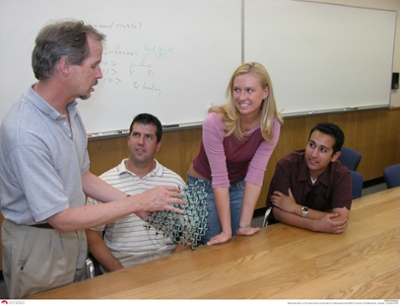Course Redesign
** The STEM Gateway grant program closed out on June 30, 2017. **
Program Description
Each year of the grant period, UNM’s STEM Gateway Program will support three, gateway-STEM course-redesign projects facilitated by STEM Gateway staff. In 2015-2016, STEM Gateway will also allow individuals or partners to submit course redesign project proposals. Each course-redesign effort will be defined by internally-solicited proposals from departments targeted by the project (those teaching one or more of 25 gateway life/physical science or mathematics courses: Biology, Chemistry, Earth & Planetary Sciences, Mathematics & Statistics, Physics & Astronomy.

The proposals will include a commitment to implement the five elements for a scientific approach to optimization of science education (modified from the Carl Wieman Science Education Initiative, University of British Columbia and the Top 25 Project at Miami University).
- Specification of measurable learning goals
- Rigorous objective assessment of student achievement of these goals
- Implementation of teaching methods aimed at maximizing achievement with respect to the specified goals, that are consistent with empirically established results and principles
- Use methods to actively engage students in their learning and with other learners and, wherever appropriate, employ inquiry-driven approaches to learning
- Reduce the amount of class time spent on low-level memory or descriptive material by incorporating approaches to facilitate students learning this material outside of class
- Methods are built on specific student learning outcomes tied to assessment that continuously monitors student learning and modifies the course as necessary
- Means for easy dissemination and duplication of materials, methods, and technology
- Sustainable and continued optimization based on results of assessment
Quick Links
- STEM Gateway Course Redesign Teaching Professional Development: Resources for Teaching and Learning
- Background information about the Gateway Science and Math Course-Redesign Program
- Proposal Evaluation Rubric
- Resource webpage to inspire and assist in the preparation of course-redesign proposals
- Dr. Bill Woods - UNM Presentation, Chaning the Way We Teach: Why We Should & How We Can. September 12, 2013 to UNM Biology Faculty. (Presentation) (Video Part 1) (Video Part 2)
- "Large introductory undergraduate courses often fail to give students an adequate understanding of science and discourage some from pursuing science majors. Part of the problem is the way these courses are traditionally taught. We can do better, by taking a more scientific approach to teaching and applying recent research on how people learn. The seminar will discuss the rationale for and practice of alternative teaching approaches for large classes, some evidence that these approaches result in more student learning, reasons why such change is hard for both students and faculty, and ideas for how to help it happen anyway."
